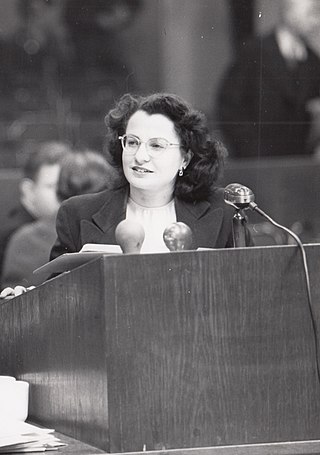Top Qs
Timeline
Chat
Perspective
Cecelia Goetz
American lawyer and bankruptcy judge (1917–2004) From Wikipedia, the free encyclopedia
Remove ads
Cecelia Helen Goetz (September 30, 1917 – January 26, 2004) was an American lawyer and bankruptcy judge who served as a prosecutor at the Nuremberg trials.
Remove ads
Early life
Goetz graduated from Textile High School in Chelsea, where she was editor-in-chief of the school paper.[1] Goetz earned her law degree from New York University School of Law where she served as editor-in-chief of the New York University Law Review—the first woman named editor-in-chief of a major American law journal[2]—and graduated as salutatorian in 1940.[3][4][5] While in law school, she studied abroad at the Sorbonne.[1] As of her graduation in 1940, she lived at 2015 Avenue I in Brooklyn.[6]
Remove ads
Nuremberg
After initially being rebuffed, Goetz took a job at the Department of Justice in the equivalent of today's Civil Division.[4][7] She applied to serve as a Nuremberg prosecutor, was rebuffed again at the instance of the Department of War,[5] but was eventually given a "waiver of disability" by Telford Taylor so she could serve.[8][9][8] The "disability" was her gender.[8][8] She had been offered a supervisor's role at Justice—the first woman to be given such an opportunity—but declined it in favor of work at Nuremberg.[10]
She was first involved in the Flick Trial[11] and then became Associate Counsel on the trial of Alfred Krupp,[9] delivering the opening statement on December 8, 1947.[12] She was one of four women on the Nuremberg prosecution team and, as Associate Counsel, she outranked six men.[5][13] At the time, she observed that "[t]o get a decision in this case would, in my opinion, be a great step toward avoiding future wars."[1] She would later describe her participation in the trials as "the most important work I have ever been involved in."[13]
Remove ads
Private practice and government
After Nuremberg, Goetz returned to the United States. She worked at her father Isidor Goetz's firm, Goetz & Goetz,[1][14] and later became the first woman to serve as Assistant Chief Counsel to the Economic Stabilization Agency.[9] She was later Special Assistant to the Attorney General in the Tax Division of the Department of Justice.[15] In 1964, she was admitted to the partnership at Herzfeld & Rubin, a New York law firm.[9]
Judicial career
Goetz was appointed a United States Bankruptcy Judge in 1978,[9] becoming the first woman to serve as Bankruptcy Judge in New York's Eastern District.[3] Her chambers were in Happauge, New York.[16] In the early 1990s, Goetz oversaw the bankruptcy proceedings of Braniff International Airways, which had filed under Chapter 11 in August 1991.[16] She served until 1993,[17] returning to Herzfeld & Rubin thereafter.[18]
Remove ads
Works
- Goetz, Cecelia H.; Hoenig, Michael (1974). "A Rational Approach to 'Crashworthy' Automobiles: The Need for Judicial Responsibility". Southwestern University Law Review. 6 (1): 1–87. ISSN 0886-3296 – via HeinOnline.
- Goetz, Cecelia H. (1980). "The Basic Rules of Antitrust Damages". Antitrust Law Journal. 49 (1): 125–140. ISSN 0003-6056. JSTOR 40840258.
- Goetz, Cecelia H. (1982). "Bankruptcy". Brooklyn Law Review. 48 (4): 821–44. ISSN 0007-2362 – via HeinOnline.
- Goetz, Cecelia H. (1982). "Consumer Bankruptcies: Should Ability-to-Pay Condition Bankruptcy Relief?". New York Law School Law Review. 27 (3): 705–744. ISSN 0145-448X – via HeinOnline.
- Goetz, Cecelia H. (1999). "Impressions of Telford Taylor at Nuremberg". Columbia Journal of Transnational Law. 37: 669–672. ISSN 0010-1931 – via HeinOnline.
Remove ads
Notes
Sources
Further reading
External links
Wikiwand - on
Seamless Wikipedia browsing. On steroids.
Remove ads

